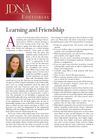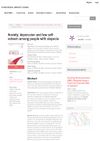 1 citations,
September 2017 in “Textual Practice”
1 citations,
September 2017 in “Textual Practice” The document concludes that Hilary Mantel's memoir shows how childhood experiences affect adult health, criticizing modern medicine for ignoring the mental aspects of physical illness.
 36 citations,
November 2018 in “American Journal of Clinical Dermatology”
36 citations,
November 2018 in “American Journal of Clinical Dermatology” Alopecia is linked to various health and mental conditions, impacts life quality, and needs medical attention beyond its cosmetic effects.
 May 2018 in “Academic Medicine”
May 2018 in “Academic Medicine” Hair loss can cause significant emotional and psychological distress.
 14 citations,
February 2000 in “Feminism & Psychology”
14 citations,
February 2000 in “Feminism & Psychology” The entry showed that PCOS negatively affects women's self-image and is worsened by societal expectations, suggesting a need for more feminist attention to the condition.
 6 citations,
August 2016 in “Journal of women & aging”
6 citations,
August 2016 in “Journal of women & aging” Older women reported negative physical and psychological effects from Botox and facial fillers, feeling neglected by the medical system.
 1 citations,
July 2019 in “Journal of the Dermatology Nurses' Association”
1 citations,
July 2019 in “Journal of the Dermatology Nurses' Association” The author found the Dermatology Nurses’ Association’s annual meeting valuable for both learning and making friends.
 34 citations,
August 2005 in “Dermatologic Clinics”
34 citations,
August 2005 in “Dermatologic Clinics” Stress and emotional factors can worsen skin conditions by affecting the immune system.
 5 citations,
October 2018 in “Research in psychotherapy”
5 citations,
October 2018 in “Research in psychotherapy” The Italian version of a relationship scale was adapted for cancer patients, showing some differences from the original and suggesting its use could improve therapy and treatment adherence.
 January 2025 in “HORMONES”
January 2025 in “HORMONES” Gender-affirming hormone treatments need better patient-focused outcome measurements and standardized data collection.
 January 2002 in “Dermatology + psychosomatics”
January 2002 in “Dermatology + psychosomatics”  March 2020 in “Journal of Cosmetic Dermatology”
March 2020 in “Journal of Cosmetic Dermatology” Hair loss affects self-esteem; patients seek effective, low side-effect treatments.

Minoxidil is the only approved cream for hair loss, but new treatments are being looked into.
14 citations,
August 2021 in “Molecular Genetics and Metabolism Reports” Pegvaliase effectively reduces blood phenylalanine levels in most PKU patients, but requires personalized plans and good communication to manage side effects.
9 citations,
February 2018 in “Journal of Patient-Reported Outcomes” New tools were created to help lupus patients report their symptoms and impacts more accurately.
 1 citations,
May 2015 in “Primary Health Care”
1 citations,
May 2015 in “Primary Health Care” Effective acne treatment varies by type, with topical and oral medications showing strong evidence, and patient education and support are crucial.
 40 citations,
November 2011 in “American Journal of Human Biology”
40 citations,
November 2011 in “American Journal of Human Biology” Stress from being transgender is linked to higher blood pressure at night and more inflammation, which may affect heart health.
 3 citations,
April 2019 in “Clinical Therapeutics”
3 citations,
April 2019 in “Clinical Therapeutics” Computational tools identified 29 drugs that could potentially target 19 genes involved in chemotherapy-induced hair loss, which could lead to more effective treatments.
 177 citations,
July 2004 in “The Journal of Sexual Medicine”
177 citations,
July 2004 in “The Journal of Sexual Medicine” Experts recommend thorough medical, sexual, and psychosocial assessments for women's sexual dysfunctions, and suggest individualized treatment plans with regular check-ups. They also mention potential use of estrogen and androgen therapy, but with caution due to safety concerns.
 1 citations,
April 2017 in “Journal of Investigative Dermatology”
1 citations,
April 2017 in “Journal of Investigative Dermatology” Tofacitinib may help regrow hair in severe alopecia areata, but results differ greatly between people.
 October 2023 in “Skin health and disease”
October 2023 in “Skin health and disease” Alopecia areata costs individuals about 3% of their income, with women, Asians, those with lower income, and more severe symptoms spending more.
 January 2012 in “Elsevier eBooks”
January 2012 in “Elsevier eBooks” Hair loss can cause emotional and social issues, and various treatments, including medication, surgery, and psychological support, are needed.
 15 citations,
March 2014 in “Body Image”
15 citations,
March 2014 in “Body Image” Wig users with alopecia do a lot of emotional and practical work to make their wigs look natural and manage how others see them.
 April 2023 in “Journal of the American Psychoanalytic Association”
April 2023 in “Journal of the American Psychoanalytic Association” Male pattern hair loss can cause significant emotional distress for men.
 April 2015 in “Cambridge University Press eBooks”
April 2015 in “Cambridge University Press eBooks” Many women experience sexual dysfunction, but few seek help, and better treatment and medical training are needed.
 5 citations,
September 2021 in “Southern African Journal of Hiv Medicine”
5 citations,
September 2021 in “Southern African Journal of Hiv Medicine” The guideline provides healthcare professionals in South Africa with instructions for comprehensive, multidisciplinary gender-affirming care, including HIV prevention and treatment for transgender and gender diverse individuals.
 September 2008 in “Fertility and Sterility”
September 2008 in “Fertility and Sterility” Greater intimacy leads to better self-reported health in couples having infertility treatment.
 March 2024 in “Clinical, cosmetic and investigational dermatology”
March 2024 in “Clinical, cosmetic and investigational dermatology” Severe alopecia areata greatly impacts quality of life, mental health, and daily activities.
 10 citations,
March 2018 in “Anais Brasileiros De Dermatologia”
10 citations,
March 2018 in “Anais Brasileiros De Dermatologia” More hair loss leads to higher risk of psychosexual disorders, especially in women.
 10 citations,
March 2021 in “Pediatric dermatology”
10 citations,
March 2021 in “Pediatric dermatology” Dermatologists should understand cultural practices and communicate empathetically to effectively treat skin conditions in children and teens of color.
 September 2023 in “Khyber Medical University Journal”
September 2023 in “Khyber Medical University Journal” People with alopecia often feel anxious, depressed, and have low self-esteem.



























